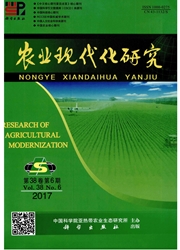

 中文摘要:
中文摘要:
产业的结构和产业生产组织方式随着人类文明不同发展阶段,在不断地演变与发展。为贯彻落实西藏自治区第七次党代会明确提出的“一产上水平,二产抓重点,三产大发展”的产业经济发展战略,探索具有中国特色、西藏特点的产业发展路径,文章基于产业演进的理论,采用西藏统计年鉴的相关数据,运用定性和定量分析方法,研究西藏产业在农业文明、工业文明和生态文明的不同文明阶段的演进特点和变化趋势。针对影响西藏产业发展的资源因素、经济因素、技术因素和政策因素等,根据产业演进变化规律和趋势,以生态文明建设为目标,构建了西藏产业在生态文明时代的发展框架和发展路径:培育产业的生态文化;实施产业的知识化、信息化和科技化;整合产业链提高产业集聚效益;采取发展可持续发展的生态经济产业;开展产业生态教育和产业生态管理。
 英文摘要:
英文摘要:
D ifferent phases of hum an civilization w itness the developm ent of industrial structures and production organization m odes. T he Seventh C ongress M eeting of the T ibet A utonom ous R egion established the developm ent strategy ofTibet:to increase the production levelin the prim ary industry,to focuson prioritized sectorsin the secondary industry, and to prom ote the fast developm ent of the tertiary industry. T his research seeks to explore the m easures to im plem ent the developm ent strategy and to identify the industrial developm ent path w ith typical C hinese and T ibetan characteristics. B ased on the industrial evolution theory and using data from the T ibetan Y earbook and applying the qualitative and the quantitativeanalysismethod,thispaperanalyzedthecharacteristicsandtrendsofTibetanindustryat different stages of agricultural, industrial, and ecological civilizations and suggested the theoretical fram ew ork and developm ent path for ecological civilization in T ibet. T hese suggestions include:1) cultivating ecological culture;2) developing industry based on advanced know ledge, inform ation, and scientific technology;3) integrating industrial chains to im prove the efficiency of industrial agglom eration;4) developing sustainable ecological industry;and 5) carrying outecology education and im plem enting properecologicalm anagem ent.
 同期刊论文项目
同期刊论文项目
 同项目期刊论文
同项目期刊论文
 期刊信息
期刊信息
